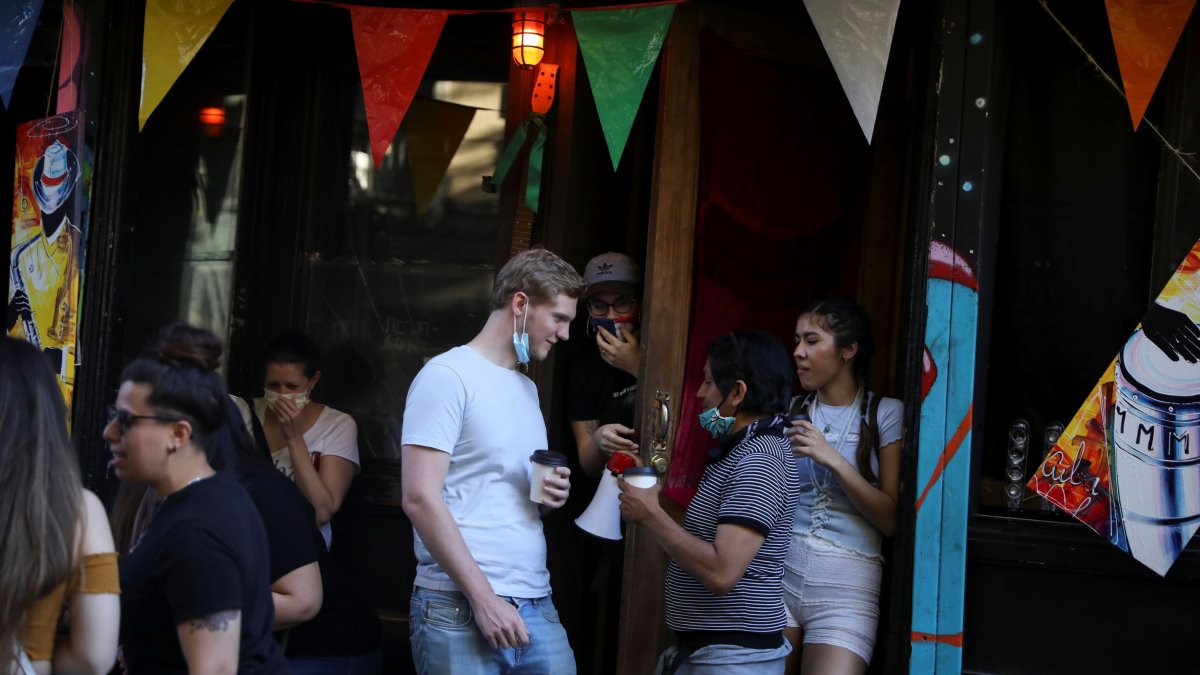- Thursday, a dating app, sets up in-person events once a week for singles to meet.
- It’s part of a new wave of dating experiences that encourage people to meet in person.
- New apps and legacy apps are embracing the end of pandemic restrictions and people’s desires to connect, hoping to forge deeper relationships.
A handful of twenty-somethings stand at the door of The Gin Mill, a New York City bar, trying to get past the bouncer. But instead of just producing IDs, anyone wanting to get in has to show they had a dating app on their phone.
The singles event, hosted by the dating company Thursday, has become a regular occurrence across the city. The company operates its namesake app, which has all the features of a normal dating app, but with a twist: It’s only available to use once a week, on Thursdays.
The company unlocks the option to match at midnight every Thursday and people have until the end of the day to connect with and message other users. It creates a sense of urgency. In an effort to actually get people out of the house, Thursday hosts in-person meet-ups that same night across New York and London, where the company is based.
At the end of the day, the slate is wiped clean and all of the matches and conversations disappear. And it all begins again the next week.
The company’s app is part of a new wave of dating experiences that encourage people to meet in person instead of just messaging other users. And it’s one example of how new apps and legacy apps are embracing the end of pandemic restrictions and a desire to connect, hoping to forge deeper relationships.
Breaking up with pen pals
For several years, dating apps have just been just a platform for connecting people. In most cases, a user will swipe left to pass on someone, or right to show interest. A matched pair can start messaging. It’s up to the couple if they want to meet up. But oftentimes, users complain of a “pen pal” situation, where they message for several days or weeks and an in-person date never materializes. The conversation is bound to fizzle out.
“It’s hard to get chemistry through text, sometimes it better to see somebody face to face,” Ron, a 32-year-old who declined to share his last name because he didn’t want to make his dating life public, said at the Thursday event.
Or, as Matthew Bunch, 22, put it bluntly: “Those apps can go suck a–.”
But with the Covid-19 pandemic came a reimagining of the apps. Since meeting in person became a risky or impossible option for many, dating apps turned to video, audio and gaming experiences. Now, as people start to reenter the dating scene and several health restrictions have lifted, the latest focus appears to be on getting people back together.
The features could help attract a group of users who may get burned out from constant swiping or want to completely disregard the apps, choosing to attend events to meet people in person. Some Thursday users said they ignore matching on the app, and instead, just use it to get into the events.
While more people are using dating apps than ever, analysts believe there’s still room for growth. Over the next several years, the global online dating market is expected to grow at a 13% compound annual growth rate, to reach nearly $10 billion in 2025, Piper Sandler wrote in a January note.
By hosting these in-person events, companies have the hope consumers will interact in a way that hasn’t been done yet in online dating. The events could draw more people to the apps and persuade them to spend more on premium features, like boosting their profiles or getting unlimited swipes, and tell friends of success stories.
Match, part of Match Group’s portfolio, has been working on developing Meet, a feature that it hopes will take people from online to in-person dating “without necessarily having to go through the traditional loop of sending likes and waiting for matches and spending time in a chat.”
“I think the next phase in dating apps, and what we’re exploring, is really going to be around rethinking that dating experience, especially how you bridge the gap and connect people in a more natural and organic way,” Match’s chief product and revenue officer Dushyant Saraph said in an interview. Match Group also owns Tinder and Hinge, which have focused more on in-app social developments.
Bumble, for its part, has focused on providing a safe space for people to meet up. The company opened Bumble Brew, a café and wine bar, in New York last year. It has since temporarily closed due to pipes freezing.
Fourplay, which is raising its pre-seed fund, has 12,000 users in New York.
Dating is becoming social
Dating apps are taking what could be an awkward, uncomfortable experience of a first date and making it a social experience.
“People go on first dates and a lot of the time, anecdotally in our experience at least, it’s often a waste of time in that it doesn’t lead to anything after that,” Danielle Dietzek, co-founder of social dating company Fourplay Social, told CNBC.
Users sign-up for the Fourplay app on their own, but are asked to send an invite link to a friend so they can create a “team.” The two people then create a shared profile. Teams then swipe through other teams and once two teams like each other, the four users can start messaging.
Fourplay, which is raising its pre-seed fund, has 12,000 users in New York and is planning on expanding to other cities, co-founder Julie Griggs said in an interview. The company is in the process of planning its first singles event for next month in New York.
Even if a person finds they have no chemistry with a person they matched with earlier on an app, the benefit of a singles event is they can move on to one of the other participants with little stress. People are also finding the apps provide a new way to make friends.
A handful of the women huddled together at Thursday’s event said that, while they may not be finding dates just yet, they’re at least bonding with one another.
Subscribe to CNBC on YouTube.



